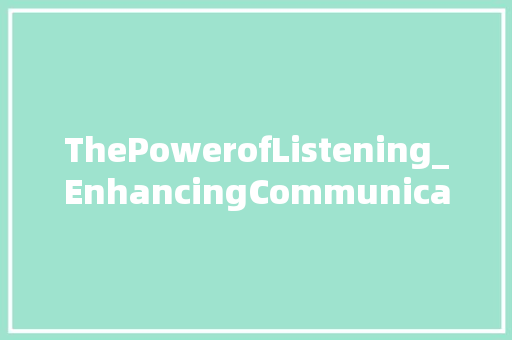Introduction:
In today's fast-paced world, effective communication is crucial for personal and professional success. One key aspect of effective communication is the ability to listen actively. This article explores the importance of listening, its benefits, and provides practical tips on how to improve listening skills. By understanding the power of listening, we can enhance our communication and build stronger relationships.

I. The Importance of Listening
1.1 Understanding Others:
Listening allows us to understand others' perspectives, emotions, and needs. By actively listening, we can gain insights into their thoughts and feelings, which helps us build empathy and establish stronger connections.
1.2 Effective Communication:
Good listening skills are essential for effective communication. When we listen attentively, we can respond appropriately, avoid misunderstandings, and foster clearer and more meaningful conversations.
1.3 Building Relationships:
Listening is a fundamental aspect of building relationships. By showing genuine interest in others and actively listening to their concerns, we can create a supportive and collaborative environment.
II. Benefits of Active Listening
2.1 Improved Communication:
Active listening leads to more effective communication. By understanding the speaker's message, we can provide accurate feedback, ask relevant questions, and contribute meaningfully to the conversation.
2.2 Enhanced Problem-Solving:
Listening attentively helps us gather valuable information, which is crucial for problem-solving. By understanding the root causes of an issue, we can develop more effective solutions.
2.3 Personal Growth:
Active listening promotes personal growth by encouraging us to learn from others, gain new perspectives, and develop emotional intelligence.
III. Tips for Improving Listening Skills
3.1 Focus on the Speaker:
Maintain eye contact, nod, and show interest in the speaker's message. Avoid distractions and give your full attention to the conversation.
3.2 Avoid Interrupting:
Resist the urge to interrupt or finish the speaker's sentences. Allow them to express their thoughts fully before responding.
3.3 Reflect and Clarify:
Paraphrase or summarize the speaker's message to ensure you understand their perspective. Ask clarifying questions if needed.
3.4 Be Empathetic:
Try to put yourself in the speaker's shoes and understand their emotions. Show empathy and offer support when appropriate.
3.5 Practice Active Listening:
Like any skill, active listening requires practice. Engage in regular conversations and focus on developing your listening abilities.
IV. The Power of Listening in Different Contexts
4.1 Personal Relationships:
Listening is crucial in personal relationships, such as between friends, family, and partners. It helps build trust, strengthens bonds, and creates a supportive environment.
4.2 Professional Settings:
Effective listening is essential in the workplace, where it can improve teamwork, enhance productivity, and foster a positive work culture.
4.3 Public Speaking:
As a speaker, active listening can help you understand your audience's needs and adapt your message accordingly. This leads to more engaging and impactful presentations.
V. Conclusion
The power of listening cannot be overstated. By developing strong listening skills, we can enhance our communication, build stronger relationships, and achieve personal and professional success. Active listening is a valuable skill that requires practice and dedication. By incorporating the tips outlined in this article, we can become better listeners and create a more connected world.
References:
- American Psychological Association (APA). (2019). Active Listening. Retrieved from https://www.apa.org/topics/listening
- Communication Studies. (2018). The Importance of Listening. Retrieved from https://www.comstudies.org/the-importance-of-listening/
- Harvard Business Review. (2019). The Power of Listening. Retrieved from https://hbr.org/2019/05/the-power-of-listening









